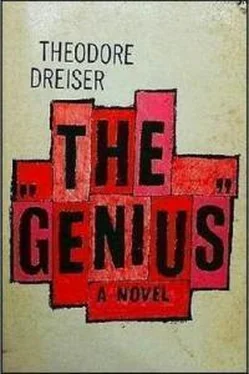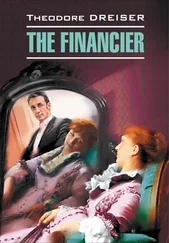Теодор Драйзер - The Genius
Здесь есть возможность читать онлайн «Теодор Драйзер - The Genius» весь текст электронной книги совершенно бесплатно (целиком полную версию без сокращений). В некоторых случаях можно слушать аудио, скачать через торрент в формате fb2 и присутствует краткое содержание. Год выпуска: 2014, Издательство: epubBooks Classics, Жанр: Классическая проза, на английском языке. Описание произведения, (предисловие) а так же отзывы посетителей доступны на портале библиотеки ЛибКат.
- Название:The Genius
- Автор:
- Издательство:epubBooks Classics
- Жанр:
- Год:2014
- ISBN:нет данных
- Рейтинг книги:4 / 5. Голосов: 1
-
Избранное:Добавить в избранное
- Отзывы:
-
Ваша оценка:
- 80
- 1
- 2
- 3
- 4
- 5
The Genius: краткое содержание, описание и аннотация
Предлагаем к чтению аннотацию, описание, краткое содержание или предисловие (зависит от того, что написал сам автор книги «The Genius»). Если вы не нашли необходимую информацию о книге — напишите в комментариях, мы постараемся отыскать её.
The Genius — читать онлайн бесплатно полную книгу (весь текст) целиком
Ниже представлен текст книги, разбитый по страницам. Система сохранения места последней прочитанной страницы, позволяет с удобством читать онлайн бесплатно книгу «The Genius», без необходимости каждый раз заново искать на чём Вы остановились. Поставьте закладку, и сможете в любой момент перейти на страницу, на которой закончили чтение.
Интервал:
Закладка:
So they have to operate, after all, he thought. She is as bad as that. The Cæsarian operation. Then they couldn't even get the child from her by killing it. Seventy–five per cent. of the cases recorded were successful, so the book said, but how many cases were not recorded. Was Dr. Lambert a great surgeon? Could Angela stand ether—with her weak heart?
He stood there looking at this wonderful picture while Dr. Lambert quickly washed his hands. He saw him take a small gleaming steel knife—bright as polished silver. The old man's hands were encased in rubber gloves, which looked bluish white under the light. Angela's exposed flesh was the color of a candle. He bent over her.
"Keep her breathing normal if you can," he said to the young doctor. "If she wakes give her ether. Doctor, you'd better look after the arteries."
He cut softly a little cut just below the centre of the abdomen apparently, and Eugene saw little trickling streams of blood spring where his blade touched. It did not seem a great cut. A nurse was sponging away the blood as fast as it flowed. As he cut again, the membrane that underlies the muscles of the abdomen and protects the intestines seemed to spring into view.
"I don't want to cut too much," said the surgeon calmly—almost as though he were talking to himself. "These intestines are apt to become unmanageable. If you just lift up the ends, doctor. That's right. The sponge, Miss Wood. Now, if we can just cut here enough"—he was cutting again like an honest carpenter or cabinet worker.
He dropped the knife he held into Miss Wood's bowl of water. He reached into the bleeding, wound, constantly sponged by the nurse, exposing something. What was that? Eugene's heart jerked. He was reaching down now in there with his middle finger—his fore and middle fingers afterwards, and saying, "I don't find the leg. Let's see. Ah, yes. Here we have it!"
"Can I move the head a little for you, doctor?" It was the young doctor at his left talking.
"Careful! Careful! It's bent under in the region of the coccyx. I have it now, though. Slowly, doctor, look out for the placenta."
Something was coming up out of this horrible cavity, which was trickling with blood from the cut. It was queer a little foot, a leg, a body, a head.
"As God is my judge," said Eugene to himself, his eyes brimming again.
"The placenta, doctor. Look after the peritoneum, Miss Wood. It's alive, all right. How is her pulse, Miss De Sale?"
"A little weak, doctor."
"Use less ether. There, now we have it! We'll put that back. Sponge. We'll have to sew this afterwards, Willets. I won't trust this to heal alone. Some surgeons think it will, but I mistrust her recuperative power. Three or four stitches, anyhow."
They were working like carpenters, cabinet workers, electricians. Angela might have been a lay figure for all they seemed to care. And yet there was a tenseness here, a great hurry through slow sure motion. "The less haste, the more speed," popped into Eugene's mind—the old saw. He stared as if this were all a dream—a nightmare. It might have been a great picture like Rembrandt's "The Night Watch." One young doctor, the one he did not know, was holding aloft a purple object by the foot. It might have been a skinned rabbit, but Eugene's horrified eyes realized that it was his child—Angela's child—the thing all this horrible struggle and suffering was about. It was discolored, impossible, a myth, a monster. He could scarcely believe his eyes, and yet the doctor was striking it on the back with his hand, looking at it curiously. At the same moment came a faint cry—not a cry, either—only a faint, queer sound.
"She's awfully little, but I guess she'll make out." It was Dr. Willets talking of the baby. Angela's baby. Now the nurse had it. That was Angela's flesh they had been cutting. That was Angela's wound they were sewing. This wasn't life. It was a nightmare. He was insane and being bedeviled by spirits.
"Now, doctor, I guess that will keep. The blankets, Miss De Sale. You can take her away."
They were doing lots of things to Angela, fastening bandages about her, removing the cone from her mouth, changing her position back to one of lying flat, preparing to bathe her, moving her to the rolling table, wheeling her out while she moaned unconscious under ether.
Eugene could scarcely stand the sickening, stertorous breathing. It was such a strange sound to come from her—as if her unconscious soul were crying. And the child was crying, too, healthily.
"Oh, God, what a life, what a life!" he thought. To think that things should have to come this way. Death, incisions! unconsciousness! pain! Could she live? Would she? And now he was a father.
He turned and there was the nurse holding this littlest girl on a white gauze blanket or cushion. She was doing something to it—rubbing oil on it. It was a pink child now, like any other baby.
"That isn't so bad, is it?" she asked consolingly. She wanted to restore Eugene to a sense of the commonplace. He was so distracted looking.
Eugene stared at it. A strange feeling came over him. Something went up and down his body from head to toe, doing something to him. It was a nervous, titillating, pinching feeling. He touched the child. He looked at its hands, its face. It looked like Angela. Yes, it did. It was his child. It was hers. Would she live? Would he do better? Oh, God, to have this thrust at him now, and yet it was his child. How could he? Poor little thing. If Angela died—if Angela died, he would have this and nothing else, this little girl out of all her long, dramatic struggle. If she died, came this. To do what to him? To guide? To strengthen? To change? He could not say. Only, somehow, in spite of himself, it was beginning to appeal to him. It was the child of a storm. And Angela, so near him now—would she ever live to see it? There she was unconscious, numb, horribly cut. Dr. Lambert was taking a last look at her before leaving.
"Do you think she will live, doctor?" he asked the great surgeon feverishly. The latter looked grave.
"I can't say. I can't say. Her strength isn't all that it ought to be. Her heart and kidneys make a bad combination. However, it was a last chance. We had to take it. I'm sorry. I'm glad we were able to save the child. The nurse will give her the best of care."
He went out into his practical world as a laborer leaves his work. So may we all. Eugene went over and stood by Angela. He was tremendously sorry for the long years of mistrust that had brought this about. He was ashamed of himself, of life—of its strange tangles. She was so little, so pale, so worn. Yes, he had done this. He had brought her here by his lying, his instability, his uncertain temperament. It was fairly murder from one point of view, and up to this last hour he had scarcely relented. But life had done things to him, too. Now, now― Oh, hell, Oh, God damn! If she would only recover, he would try and do better. Yes, he would. It sounded so silly coming from him, but he would try. Love wasn't worth the agony it cost. Let it go. Let it go. He could live. Truly there were hierarchies and powers, as Alfred Russel Wallace pointed out. There was a God somewhere. He was on His throne. These large, dark, immutable forces, they were not for nothing. If she would only not die, he would try—he would behave. He would! he would!
He gazed at her, but she looked so weak, so pale now he did not think she could come round.
"Don't you want to come home with me, Eugene?" said Myrtle, who had come back some time before, at his elbow. "We can't do anything here now! The nurse says she may not become conscious for several hours. The baby is all right in their care."
The baby! the baby! He had forgotten it, forgotten Myrtle. He was thinking of the long dark tragedy of his life—the miasma of it.
Читать дальшеИнтервал:
Закладка:
Похожие книги на «The Genius»
Представляем Вашему вниманию похожие книги на «The Genius» списком для выбора. Мы отобрали схожую по названию и смыслу литературу в надежде предоставить читателям больше вариантов отыскать новые, интересные, ещё непрочитанные произведения.
Обсуждение, отзывы о книге «The Genius» и просто собственные мнения читателей. Оставьте ваши комментарии, напишите, что Вы думаете о произведении, его смысле или главных героях. Укажите что конкретно понравилось, а что нет, и почему Вы так считаете.









